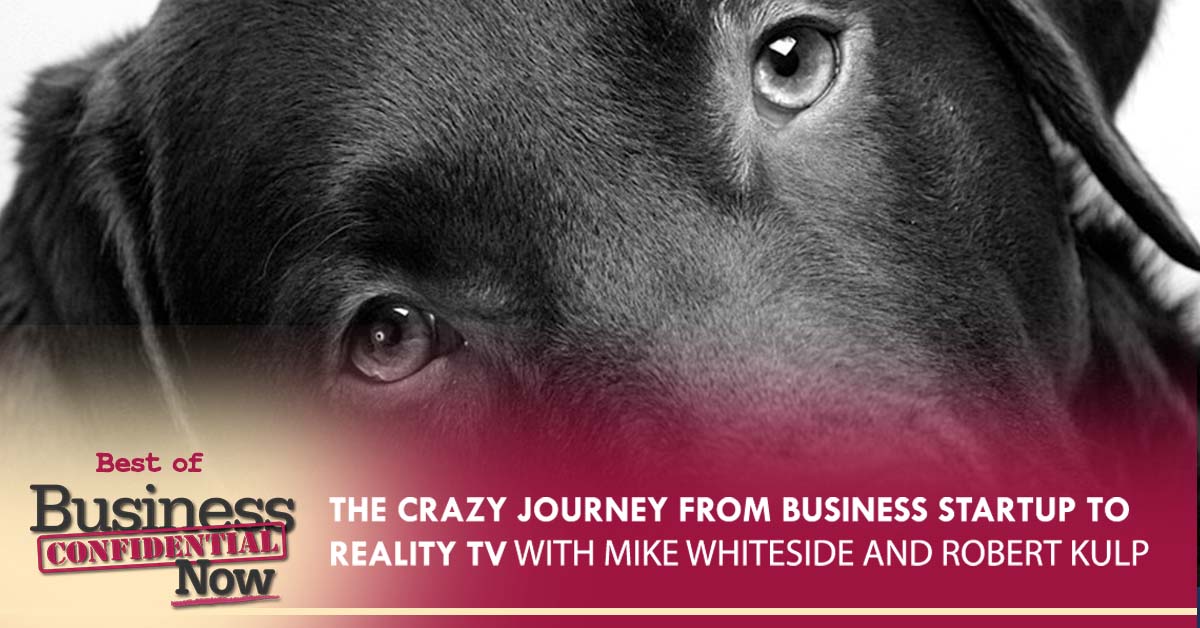
Photo Credit: © Can Stock Photo / jmpaget
Their business startup turned trash into treasure, by “up-cycling” architectural salvage. They were saving America’s past for America’s future. And as their business grew it also turned into a hit reality show on the DIY Network called “Salvage Dawgs.” Join host Hanna Hasl-Kelchner as she welcomes Black Dog Salvage founders Mike Whiteside and Robert Kulp to talk about how they built their incredible business.
—
What You’ll Discover About the Impact of Reality TV on a Successful Startup
- The twist of fate that led to the startup of Black Dog Salvage.
- Their bootstrap story of their startup success.
- The success habits each co-founder brings to the business.
- The biggest challenges faced during their startup years.
- The single biggest continuing business challenge.
- How the power of TV expands the reach of their brand platform.
- How the presence of TV cameras changes the way they work.
- How their business values and leadership put reality back into “reality” TV.
- What they’d change about their startup years if they could do it over.
- Their favorite salvage projects.
- And much MORE.
GUESTS
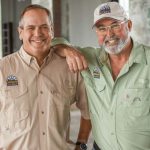 Mike Whiteside (left) and Robert Kulp (right), the co-owners of Black Dog Salvage, located in Roanoke, VA
Mike Whiteside (left) and Robert Kulp (right), the co-owners of Black Dog Salvage, located in Roanoke, VA
Mike Whiteside and Robert Kulp are the co-owners and founders of Black Dog Salvage located in beautiful rolling hills of Roanoke, Virginia. You might have seen them on popular reality TV show “Salvage Dawgs” on the DIY Network.
It’s a fun show. You get to follow them on their adventures and watch them reclaim cool architectural elements from buildings headed for the wrecking ball. They help keep those special pieces out of a landfill and prepare them for a second act. You also get to watch how some of these reclaimed materials get transformed into one-of-a-kind furniture that can add a lot of personality and charm to any room in your home and be great conversation starters.
Mike Whiteside has an eclectic background. He’s a former Navy parachute rigger and traveled the world serving our country. His love of travel and the sea also led him to a 15- year career as a professional sailor and yacht captain. Other unique jobs include ski lift operator and chair seat weaver. Interestingly, that creativity is now channeled into tackling design challenges and helping customers create unique treasures from the company’s salvage items. And his master rigging skills from the Navy come in handy too, often providing a safety net during salvage operations, where no task is impossible and he’s been known to say “go big, go hard, go fast, or go home.” But, Mike does know his limits.
Robert Kulp also has a fascinating background and a Navy connection. Robert is a former Naval Officer with a degree in Building Construction from Virginia Tech. He has a real passion for architectural details and a terrific understanding of the value of those reclaimed building parts. He’s all about “attention to details.” Robert is also a Class A General Contractor, and that lets him offer solid advice and services for period restorations, whether it’s “new” house with a vintage vibe or blending a new addition into an existing home to make it look and feel like it’s always been there.
—
RELATED RESOURCES
Contact Mike and Robert and connect with them on YouTube, Facebook, Twitter, Google+, Pinterest and Instagram.
—
The Crazy Journey From Business Startup To Reality TV With Mike Whiteside And Robert Kulp
Their business startup was based on turning trash into treasure by upcycling architectural salvage. They were saving America’s past for America’s future. As their business grew, it also turned into a hit reality TV show. In a moment, my special guests, Mike Whiteside and Robert Kulp will tell you all about their amazing journey of how they built their incredible business, Black Dog Salvage.
—
Mike Whiteside and Robert Kulp are the Co-Owners and Founders of Black Dog Salvage, located in the beautiful Rolling Hills of Roanoke, Virginia. You might have seen them on the popular reality TV show Salvage Dawgs on the DIY Network. It’s a fun show. You get to follow them on their adventures and watch them reclaim cool architectural elements from buildings headed for the wrecking ball. They help keep those special pieces out of the landfill and prepare them for a second act.
You get to watch how some of those reclaimed materials get transformed into a one-of-a-kind furniture piece that can add a lot of personality to your home and be a great conversation starter. Before we dive more into their entrepreneurial journey, let me tell you a little bit about Mike and Robert. Mike Whiteside has an eclectic background. He’s a former Navy parachute rigger and traveled the world, serving our country. His love of travel and the sea also led him to a fifteen-year career as a professional sailor and yacht captain. His other unique jobs include ski lift operator and chair seat weaver.
Interestingly, that creativity is channeled into tackling design challenges and helping customers create special treasures from the company’s salvage items. His master rigging skills from the Navy come in handy, too, often providing a safety net during salvage operations where no task is impossible. He’s been known to say, “Go big, go hard, go fast or go home.” Mike doesn’t know his limits. Welcome to the show, Mike.
How are you?
I’m terrific. Mike, your Co-Owner in Black Dog Salvage. Robert Kulp also has a fascinating background and a Navy connection. He’s a former Naval Officer with a degree in building construction from Virginia Tech. He has a real passion for architectural detail and a terrific understanding of the value of those reclaimed building parts. He’s all about attention to detail. Robert is also a Class A General Contractor. That lets him offer solid advice and services for period restorations, whether it’s a new house with a vintage vibe or blending a new addition into an existing home to make it look and feel like it’s always been there. Welcome to the show, Robert.
It’s good to be here. Thank you.
It’s a special treat to have you both with us. I can’t wait to learn more about how you started your business. That’s what this is all about, that whole entrepreneurial journey. Mike, tell us about how Black Dog Salvage got started.
Years ago, it was truly an accident. I wish I could say that it was a thought-out process, but I had finished a career in the yachting business, and my wife was from Roanoke. We moved up here to raise our kids, and I needed something to do. I wanted to build a garage, and I ran into Robert. He gave me some advice but wouldn’t build a garage for me. I still don’t understand that one. That was a good choice on his part, probably while we were working together.
It was a twist of fate. I was looking for an opportunity to do something different in an area where I’d never lived before. I met somebody who was from this area that had a base here. It was serendipity that we ran into each other and had a lot of similar interests and history, including the Navy family situation. The whole bit was parallel. We hit it off right away and decided to try something different. We went in together on one house, which started Black Dog Salvage.
The hardest challenge of running multiple businesses is to divide your time so that you can give every business its fair share.. Click To Tweet
Robert, what was your first impression when you met Mike?
He called me up because he wanted advice. He’s one of those guys that wanted to take advantage of a poor contractor, get all his knowledge, and then do it himself. That was the first step off. It was probably more our Navy connection. I told Mike if he took me to lunch, I’d tell him everything I knew about building in Roanoke County, where he was planning on building his garage. In the process of talking about our experience and everything else, we were talking about what other opportunities were out there. We got on the subject of salvage. Whether it was architectural salvage or old things, so many things are getting thrown away out there.
About that time, there had been a house being offered for free if somebody wanted to move it. That was in Downtown Roanoke. It turned out to be a pretty fabulous house. It was just in the wrong place. It was one of the oldest houses in Roanoke of the old railroad barons, and all the rest of them had been torn down. This one was going to be torn down or moved. Mike and I decided that we needed to go out there and get the salvage rights for it. We didn’t do a whole lot more thinking than that. Mike had a forklift, and I had a dump truck and some skid steers for my construction business. We both were dumb enough to think it was as simple as that, and there we went.
What personal habits have contributed to your success, Robert?
The Navy gave me a lot of organizational skills, or at least I have them. It’s being organized and able to put my fingers on information or contacts, especially as far as being able to know who to call. It has been a real edge for me. It helps me keep me sane as well, knowing that I can put my fingers on the information I’m looking for. That’s what I concentrate on specifically. Sometimes to my detriment, I’m trying to get myself organized and make sure that I have all the information I need to provide to others and keep people on track.
Good time management and a network are important. Mike, what are your personal habits that have contributed to your success?
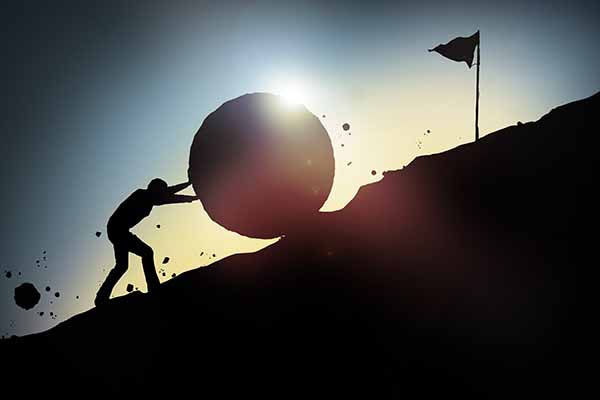
Reality TV: Hard work is important in any industry. Make a commitment to do your job and see it through. You need to show up with a good attitude and excitement for what’s to come.
What Robert said is true. That’s where he and I complement each other. He has the organizational skills, and I’m the loose cannon on deck in a good way. Nothing short of hard work is in this particular business or any business. It’s making a commitment to do a job, see it through, and do what you were going to do. You need to show up with a good attitude and excitement for what’s coming. This was way before the show. We were in business several years before we started the show. Part of what has brought us to this point is the excitement, the passion, and the love of what we do.
It comes through the way we talk about our business, present the product that we’ve reclaimed, and tell the story. It’s nothing short of giving people the excitement that we feel for the business and the history that it represents. It gets people engaged, and they start to understand why we do what we do and that it’s a lot more than just grabbing a bunch of old stuff and throwing it in the building.
A friend of mine who teaches Business Planning and so forth would refer to those as moments of truth. Every touchpoint with a prospect or a customer is an opportunity to show that you mean what you do. That comes through so loud and clear in the work that you do. That’s why I respect your business and what you’re accomplishing here. Robert, you mentioned how you started and that it was serendipity. You thought that, at that point in time, you could do what you were doing. What challenges did you face as you were growing your business? It sounds like you realized it took a little bit more than a house being offered for free and a dump truck.
It’s easy to salvage, and it’s enjoyable, too. It’s a challenge. It’s fun. You’re out in the field getting all this cool stuff. That first house that we salvaged, we were selling things to people right there. Somebody came along and bought one of the first towers surrounding a mantle that we took out. The return on investments is pretty big when your overhead is as low as ours was. Setting up that retail business required to make it a business is pretty hard, especially from Mike and Robert’s standpoint of, “Neither one of us had ever been in the retail business.” It formed organically from being open a couple of hours on Tuesdays to having 30 employees and being open 6 days a week.
All that knowledge in the first few years was gained organically by hit and miss and the hard way. Looking back on it, we must have been crazy. I would probably hire a few more experts upfront than I did before. The biggest challenge that you find is how much time it takes to put in to organize a business like this. At the time, I was running a construction business already. The time management thing was fairly difficult. I got a third job, which is that television show. That challenge is forever present as far as dividing your time, giving everybody or every business its fair share, and your family as well at the same time.
How about you, Mike? What were some challenges in growing the business?
Upcycled materials have other values besides the sweat and money people used to get them. Click To TweetThe one thing that Robert hit on is we can fill our building up 2 or 3 times a year with product. The hard part or the challenging part is selling it. People have to understand that what we’ve pulled out of these houses has value besides our sweat and money. It’s an economic component that is probably the most challenging. It is selling the product to people who want to buy it and are excited about buying it. We’re always dealing with wants and needs. You come in and say, “I need a door, but I want a coffee table.” Those are two different things.
When somebody says, “I need something,” I queue in immediately, “Let me help you with that need. Hopefully, I can fill that void.” They then say, “I want something special for a table. I can’t find it in the marketplace.” That’s another place that is a challenge to us. I take that challenge on as a positive because where I get excited about my business is providing and repurposing. The challenges of the business are that of anybody that’s out there starting a small business.
We are a small company. We started with Robert, me, and the dog, Molly. There were three of us. Molly added a lot of value to our brand. We picked up employees, and it started from bootstraps and grassroots. It’s been a journey. Any small business trying to do this is always hit with the reality of what it takes to make it happen. That’s probably been our biggest challenge. There is a reality to this thing.
Sourcing materials has never been our problem. The real challenge will always be, “How do we find that buyer and let them know that this great stuff is here and ready for you to purchase it?” It’s no different than any other business. It just happens that our sourcing of materials is we’re out there grabbing and going. There’s a certain price, but we have to house and feed it. We have to find somebody to sell it to. We got to reach out.
We love where we live, and we wouldn’t live anywhere else except for the Caribbean. The market is fairly small for our type of product. We’ve constantly been working on expanding that brand and our reach and trying to figure out how to reach out across the country and farther either through online sales. Finally, we lucked into a television show that expanded our reach dramatically.
Let’s talk about that show, Salvage Dawgs. How have things changed for your business since that show has gone live? What season are you in now?
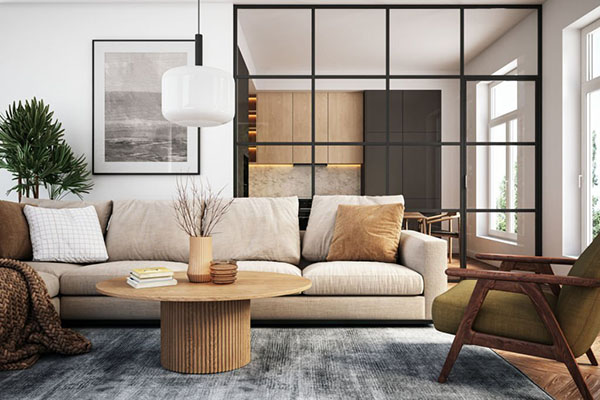
Reality TV: Salvage Dawgs is really about letting your furniture tell a story. It’s about a product that would’ve been wasted but instead, its turned into a beautiful piece of art. It already has so much history behind it.
We’re in season seven. We’ve finished the halfway mark of that particular season. We’ve got 85 episodes done, which surprises me. You wouldn’t believe that we’ve done that many episodes, and I’m tired. It’s a lot of work, but the Salvage Dawgs platform has provided an opportunity for us to expose the world to who we are and what we do.
We’re in production in the middle of season seven. We’ve already wrapped up six. The network has only shown seasons 1 through 5. They show them over and over again. The repeat performance on DIY Network and GAC Network is around the world on a lot of their sister networks and travel channels. We’re on in a lot of different countries, which is pretty interesting. You got to hear us in Italian. We’re fantastic. The reach is incredible, and it has had a big impact on visitors here in Roanoke.
People come by travel all over the country. They stop by on some strange routes from Chicago to California. Somehow Roanoke ends up in between there. It’s been gratifying to see the response of people who are captivated by what we do. It surprises us because That’s what we do on a daily basis. They come into the store and are like, “You guys are here.” We are here. We work all the time. It’s been fun, and it’s a great impact from people visiting as well as buying stuff, which is the point.
Have you found that it’s increased sales for custom items?
We’ve been doing custom items from the beginning. It was a way of adding value to our products. A door is a door, and it can be more. It can be a headboard, table, or wainscot paneling. There are a lot of different things. You have to look at it a little bit differently. The custom part of our business has grown. It has started to become one of our major profit centers because we have a full shop down in our basement. We produce all kinds of wood products in the metal shop. We will build you a gate or a custom console out of architectural iron that we’ve either bought or salvaged.
That’s the fun and creative part of our business. When somebody comes here, they see that, “You guys aren’t just a scrapyard. You are setting the trend for the repurposing movement and taking this product that would have been wasted and lost and turning it into a beautiful piece of furniture that can become an heirloom to a family.” It’s already got so much history behind it of where it came from. It’s telling a story and a piece of furniture. That is truly something that we give our customers that want something that speaks to them.
A door is a door but it can also be more. It can be a headboard or a table. You just have to look at things in a different way. Click To TweetWhat’s been your favorite salvage project?
I always told people that the first salvage job was our favorite, and that was in 1999. We did a pretty incredible house that was going to be torn down in Southeast Pennsylvania in the late 1940s. It’s a Tudor mansion that found itself in the wrong place. It was built by a builder who knew something about the technology and everything else of the day and created himself a nice pad. It was all going to be torn down, and we got a chance to get in there.
It was everything from the roof tiles to the interior trim and the built ends and some of its technology, even from the early 1950s or 1940s, all-metal cabinets and stuff. The stuff was ready to be picked up and put in the truck. Although we haven’t made any money off of it yet, I see a big upside to it. It was good to get in there and save the stuff. Otherwise, its future was in the landfill. That’s always gratifying when you can shortstop that.
Thank you, Robert. It’s the same thing as what Robert said. My favorite is the one that sells for us and goes to another home. We did a house up in Fairmont, West Virginia. It was nothing to look at outside, but inside, it was incredible. Some of these houses will give up the salvage fairly easily, meaning that it was put in properly. The guy didn’t use too many nails.
That particular house went to Utah. Someone came in and saw that there was some value there, and he wanted the whole house. Probably one of my favorites was an old Navy tug/Coast Guard cutter called the Zuni Tamaroa. It was the actual boat for The Perfect Storm. That was a true story that rescued the Navy helicopter crew. This boat had seen his life through. It was the last boat afloat that was in Iwo Jima.
Understanding and appreciating history brings a tear to the eye when one knows the people who have served it and the history there and to know that we got an opportunity to go in and reclaim some of those pieces, bring them home, and repurpose them or sell them out to people who understood what it is. That was one of my favorites. It was hard work. We got to work with a cool guy that is taking this boat, and it’s going to become a reef. That’s coming up here. They’re going to sink her, but she’s going to a better purpose. She’s not being turned into a razor blade.
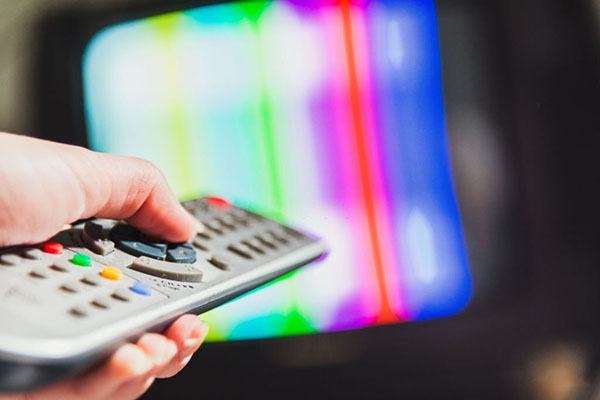
Reality TV: When doing a TV show, time is of the essence. Television folks have a limited attention span when it comes to doing projects. So you really have to get it done before they lose interest.
I can understand why. There’s maintaining the purpose and keeping it alive.
We also had a lot of fun on that episode simply because we got to role-play. Mike was an enlisted guy in the Navy, and I was an officer. He got to bust me up a little bit. I got to hang out in the wardroom and ask Mike to see if he wasn’t going to clean up around here or whatever. He was looking for some service, and I gave him the service okay.
That was a lot of fun. I hadn’t been on a Navy ship in quite a while. It was good to be back on one, even though this one was near the end of her life.
You can appreciate its history. That was the main thing. This thing had been in World War II and at Iwo Jima. That was a huge Naval battle, land attack, and pivotal point of the war in the Pacific. You’re standing on a piece of history. That was what we do.
I can see how that was a special moment for a number of reasons. It’s good to know that the ship was in good hands with you when it went to its final purpose. When you’re doing these episodes with Salvage Dawgs, how does it change when the film crew is there with you as compared to when you’re doing a salvage job without them?
Looking back on it, our operational schedule has increased dramatically since we started doing the show because the show depends on a salvage project for each episode. You got to have fodder to make this television show. If we might do six salvage jobs in a year, we’d be busy years ago. That in itself is a lot of work. In 2021, we did 26 salvage projects. For each one of them, we want to get the job done and create these episodes. Each deal is a salvage project and a business deal, and we got to get it done.
We need to put reality back into reality TV. No one wants to take time out of their day to watch people disrespecting each other. Click To TweetTime is of the essence. The television folks have a limited attention span when it comes to doing a project. We know it might take five days to get this project done, but they’re going to lose interest and get what they need in two, yet I still have to get this project done. We’ve worked harder. The best thing about the television people that we work with is when we’re working, we pretty much ignore them. They document what we do.
Otherwise, when we’re working together, we have a great time. We have a perfect working relationship. We do our best work when we don’t act like there’s a camera there, knowing that you got to mind your manners. If we start cussing a little bit, we’re wasting our time because that’s not going to be on our television shift. We try to look our best on the thing, but we’ve got a job to do, and we get it done. It so happens that it’s fairly interesting to watch.
I can speak for myself and my husband that we love it. We appreciate that you’re tearing up a building instead of each other.
We have our moments. There’s no doubt about it. We are human. We have emotions like anybody else. It’s part of the show, our interaction of how we respect each other, work together, and poke each other with a little fun humor and sometimes not so much fun humor, but it’s who we are. That’s one thing about the show that makes it easy. We don’t have to act. It’s us.
The production company, Trailblazer Studios out of Raleigh, North Carolina, follows us. We’ve got a good relationship after 85 episodes that it’s almost second nature. We set it up and go to work. You have to play to the camera, but we have to get the job done. That’s the reality. I always tell people, “We put reality back into reality TV.”
Not to mention the fact that there are real dynamics here. These are all working relationships. There are five key people on the show. We work together every day. It’s not all positive, but certainly, we respect each other and try to lead by example. There’s not a darn thing we would ask somebody to do that we wouldn’t do ourselves.

Reality TV: The most important thing in running a small business is to have somebody to share the pain with. Find a partner that you can both, teach and learn from.
In fact, most of the time, we’ll step up and have to do it ourselves instead of putting somebody else in possible danger. Who wants to watch people disrespecting each other? Taking your time out of your day to watch people be rude to each other is not something that I’d want to do. Therefore, I would hope that’s one of the appeals to the show. There’s not any made-up drama and unhealthy relationships.
It’s good teamwork. Every team has its little hiccups, but it all comes across as good. If you had the chance to start your business over again, what would you do differently? What do you know now that you wish you knew when you first started in with that house in 1999?
We both have similar but different opinions about what we do. It all has to do with organization and planning. If we were a true thought-out business, we probably would’ve come in with a business plan. We didn’t. It was a reactive situation that developed through the years. A little more planning of knowing where we want to go instead of where we might end up helps a lot. If we’d had been more organized in our early days, it’s figuring out how to fund a business. Robert and I always say we’re organically funded. That means that Robert and I pull out of one pocket and pull it into the other pocket. We funded ourselves, and that’s probably not the best business plan.
We’ve had a little help from First Citizens Bank. Certainly, planning would have been more robust. If I had the funding figured out up front, I would have hired some experts. That’s the one thing. If I had looked back at it now, I would’ve invested in somebody who knew something about it. It can be any retail business. It didn’t have to be the salvage business. That learning curve has been long and involved. It goes on now. If I’d started out with a little bit more experience in that business, or at least hired it on, I’d probably have a little bit more hair than I’ve got now.
The thing is, you’ve powered through. Some of these things might have turbocharged your business more at the beginning. Kudos to you for being persistent and having worked through these particular issues. The thing behind every successful business person is usually at least one advisor, mentor, business coach, or influencer of some kind. Could you share one of those with us, Robert?
We’ve got a lot of people who influenced us from the get-go before we started in the business. Mike and I probably have had a lot of influence on each other, rounding off edges or sharpening them as the case may be. Even through that, I would think that our employees, the people that we’ve grown the company with, whether it might be my sister, Koiner, or Christa Stephens, who has been with us for a long time, you learn a lot from each one of them, as far as looking at things differently.
You can really learn a thing or two from each of your employees. Click To TweetI can be described as a little hardcore and probably not as feeling with some customers and people along the way. I had been taught to take a second look by Christa, who is always reaching out to the community. She has always been a champion of charitable giving and thinking about how to give back to the community, whereas I might be grinding through the day-to-day business with my head down. I’d like to say there have been many employees that have been positive along the way, but I’ve got a few that have helped quite a bit.
How about you, Mike?
As far as people who have influenced and mentored us, Robert and I have mentored each other in our own way, me with my unruliness, disorganization, and funny side, and Robert with his organization and the ability to stay on task and see where we need to go. We’ve complemented each other. We wouldn’t have done it without each other. Probably the most important thing is somebody to share the pain of a small company with.
There is pain and hope. In our case, there is a reward at the end as well, but we’re not through with it yet. It’s an ongoing job or adventure that we’re on. I’ve had the ability to work with some pretty influential and wealthy folks that are self-made in my life, especially in the yachting business. One of them was Robert Jepson, who is a self-made man. He came from nothing and built a company called Jepson Associates. I learned a good work ethic. You just can’t be polite. There’s the old golden rule, “Treat people like you would like to be treated.”
Another guy I worked with is Dick Jason, who told me one time, “Mike, if you start a business, make sure that it can run without you.” That’s important because you’ll never get away and move on to the next realm of a business without people around you that can make it operate. We’ve got a great staff. David Dunkenberger is our Operations Manager. Robert mentioned Christa and Koiner, and we’ve got a great fabricator.
You’re only as good as the people you hire. They’re the ones that are going to be the face and the influence in the community. My mom is old now. She raised four kids as a waitress. Perseverance is truly one of the traits of a good person. Do the right thing, stay on task, try to be happy, be a good influence, and hope those good things will happen from there. It’s not guaranteed, but at least you’re setting a good base for it. Those are some influences in my life.

Reality TV: Find and talk to experts in the field that you’re thinking about before running out into it. Be prepared to learn because there’s very few people that have overnight successes.
Those are very important ones. A lot of people can identify with that. I was wondering if you had any parting thoughts for our entrepreneurs who are reading?
I would steer them away from the salvage business unless they like to have a television show that they can package with it. It’s a difficult local business. Mike has always said, and I often say, “You got to do the work.” The work is hard. All the things we’ve talked about here are the planning portion of it. What we will do differently would be the planning, the learning, and the knowledge. We started out because we were too dumb. We didn’t know what we didn’t know.
Reach out, find yourself some experts, and talk to people in the field that you’re thinking about before running out into it. Prioritize the things that are important. Overall, be prepared to put the time in. There are few people there that have overnight success. Our overnight success took sixteen years, and I’m looking to be more successful if I can be. Now is not enough. It’s a planning phase.
One thing that I would part to people who have the startup fever, want to be an entrepreneur, and start their own businesses is to make sure that they’re realistic about where they want to go with it, and where they want to be. Is it, “I just want to make a living and give? Do I want to build a retirement for myself and my employees?” Be realistic about that, and don’t lie to yourself. A lot of people out there got great ideas, but they’re not being honest with themselves about what it’s going to take to start a business. We’re not painting a real pretty picture, but it’s a realistic picture of what it takes to do to start from scratch and build.
There are a lot of success stories out there, but there are probably more failures. Be honest with yourself about where you want to go. Follow your passion. What’s going to carry you through when the times are lean, and the business is tough is that you still love what you do. That will carry you through a lot of dark days or sleepless nights. You wake up the next day, and you have a passion for it. You can’t short circuit that. The passion and the realistic goals are probably the most important thing besides making sure you’re covering your payroll.
You’re only as good as the people you hire because they’re going to be the face and the influence in the community. Click To TweetYou’re insured. The fundamentals of business are taught, but they are seldom learned. We learned them the hard way, Robert, probably more than me. We were fortunate to be where we are now, and it didn’t come by accident. I wanted everybody to know that it came with hard work, perseverance, and some luck. You can’t underestimate a little good fortune.
Mike, Robert, this has been terrific. I’d like to thank you, gentlemen, for sharing your journeys with us, the one on TV and Salvage Dawgs, which I hope continues for many seasons, and the one in real life at Black Dog Salvage in beautiful Roanoke, Virginia. I’m grateful for your time, the advice you shared with our readers, and for all that you do to save the craftsmanship of bygone errors. Thank you so much.
You’re welcome. Thank you.
Important Links
- Black Dog Salvage
- Salvage Dawgs
- Trailblazer Studios
- David Dunkenberger
- YouTube – Black Dog Salvage
- Facebook – Black Dog Salvage
- Twitter – Black Dog Salvage
- Google+ – Black Dog Salvage
- Pinterest – Black Dog Salvage
- Instagram – Black Dog Salvage
- 6 Keys to Creating an Excellent Customer Service Experience (with Mitche Graf) – previous episode
-
If you liked this interview you might also like these Entrepreneurship Success Stories episodes
Join, Rate and Review:
Rating and reviewing the show helps us grow our audience and allows us to bring you more of the rich information you need to succeed from our high powered guests. Leave a review at Lovethepodcast.com/BusinessConfidential
Joining the Business Confidential Now family is easy and lets you have instant access to the latest tactics, strategies and tips to make your business more successful.
Follow on your favorite podcast app here as well as on Twitter, Facebook, YouTube, and LinkedIn.
Download ♥ Follow ♥ Listen ♥ Learn ♥ Share ♥ Review ♥ Comment ♥ Enjoy
Ask Questions or Recommend a Topic/ Guest:
- Use our convenient Get in Touch form
- OR e-mail feedback(at)BusinessConfidentialRadio.com
Disclosure:
This post may contain links to products to products on Amazon.com with which I have an affiliate relationship. I may receive commissions or bonuses from your actions on such links, AT NO ADDITIONAL COST TO YOU.
